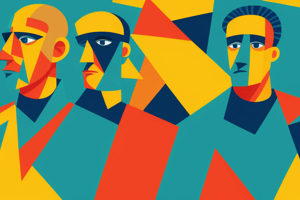Podcast
Questions and Answers
Wat beschrijft Adorno over de mens en zijn kennis?
Wat beschrijft Adorno over de mens en zijn kennis?
- De mens kan zijn kennis niet toepassen in de praktijk.
- De mens is vrij van zijn kennis en werktuigen.
- De mens heeft volledige controle over zijn kennis.
- De mens is een slaaf van zijn eigen kennis en werktuigen. (correct)
Wat zegt Dennett over het begrip bewustzijn?
Wat zegt Dennett over het begrip bewustzijn?
- Bewustzijn is volledig immaterieel.
- Er is een overkoepelend zelf dat het bewustzijn aanstuurt.
- Bewustzijn is uiteindelijk materialistisch. (correct)
- Bewustzijn is een spiritueel concept.
Welke stelling is kenmerkend voor Foucault's visie op de geschiedenis?
Welke stelling is kenmerkend voor Foucault's visie op de geschiedenis?
- De hedendaagse mens is een onafhankelijke uitvinding.
- De geschiedenis kent altijd voortgang en ontwikkeling.
- De geschiedenis verloopt discontinu zonder vooruitgang. (correct)
- De geschiedenis wordt gedreven door individuele verhalen.
Wat is de centrale gedachte achter de 'negatieve dialectiek'?
Wat is de centrale gedachte achter de 'negatieve dialectiek'?
Wat impliceert Marcuse's concept van de 'unidemensionele' mens?
Wat impliceert Marcuse's concept van de 'unidemensionele' mens?
Wat beschrijft Lyotard over de impact van technologische ontwikkelingen?
Wat beschrijft Lyotard over de impact van technologische ontwikkelingen?
Wat houdt het concept 'qualia' in?
Wat houdt het concept 'qualia' in?
Wat is de rol van de Frankfurter Schule in de filosofie?
Wat is de rol van de Frankfurter Schule in de filosofie?
Flashcards
Frankfurter Schule
Frankfurter Schule
De 'Frankfurter Schule' is een groep filosofen die zich afvragen of de rede geen autodestructieve aspecten bevat. Deze school staat bekend om haar kritische analyse van de moderne samenleving en de potentiële gevaren van rationaliteit.
Adorno
Adorno
Adorno was een Duitse, continentale filosoof die geloofde dat de mens een slaaf is geworden van zijn eigen kennis en technologie. Hij was kritisch over de moderniteit en haar gevolgen.
Derrida
Derrida
Derrida was een Franse postmodern filosoof die meende dat alles in teksten en taal vastligt. Er zijn volgens hem geen objectieve criteria om kennis of argumenten te beoordelen.
Postmodernisme
Postmodernisme
Signup and view all the flashcards
Foucault
Foucault
Signup and view all the flashcards
Dennett
Dennett
Signup and view all the flashcards
Habermas
Habermas
Signup and view all the flashcards
Lyotard
Lyotard
Signup and view all the flashcards
Study Notes
Adorno
- German, continental philosopher of the Frankfurt School
- Believes humans are enslaved by their own knowledge and tools
Dennett
- American, analytic philosopher
- Believes consciousness is fundamentally materialistic, and lacks a central controlling self
Derrida
- French, post-modern philosopher
- Argues all meaning is contained within texts and language, and no external criteria exist to judge knowledge or arguments
Foucault
- French philosopher
- Believes history isn't progressive, but rather discontinuous, with present humans being a product of specific historical circumstances
Frankfurt School
- Group of critical philosophers (Adorno, Marcuse, Habermas)
- Question if reason has self-destructive tendencies
- Focused on the examination of societal structures and the critique of power structures
Habermas
- Philosopher aligned with the Frankfurt School
- Links truth and value questions (political, ethical, etc.) to consensus-based discourse
Lyotard
- French philosopher
- Argues that large narratives (grand theory) are fragmented into smaller discourses due to technological advancements like computer science, artificial intelligence, and mass media
Marcuse
- Frankfurt School philosopher
- Believes individuals become "one-dimensional" and their values are shaped by societal systems
- Criticized the lack of individuality in this system
Negative Dialectics
- Core concept of the Frankfurt School
- Inherent limitations in rational thought, which contradict themselves over time
Parfit
- British analytic philosopher
- Seeks to explain personal identity through continuous psychological qualities and memory
Postmodernism
- Perspective that denies grand narratives, considers reality multifaceted, and eschews objective truth
Qualia
- Subjective, qualitative experiences
Rawls
- American political philosopher
- Strives to establish a just society with a focus on principles decided upon in a hypothetical original position, where bias is removed
- Acknowledges the limitations of personal biases
Rorty
- American postmodern philosopher
- Views philosophy as a form of language, without a universal standard of truth
Williams
- British analytic philosopher
- Advocated for "inner reasoning" in ethical decision-making as a counterpoint to utilitarianism
Studying That Suits You
Use AI to generate personalized quizzes and flashcards to suit your learning preferences.




